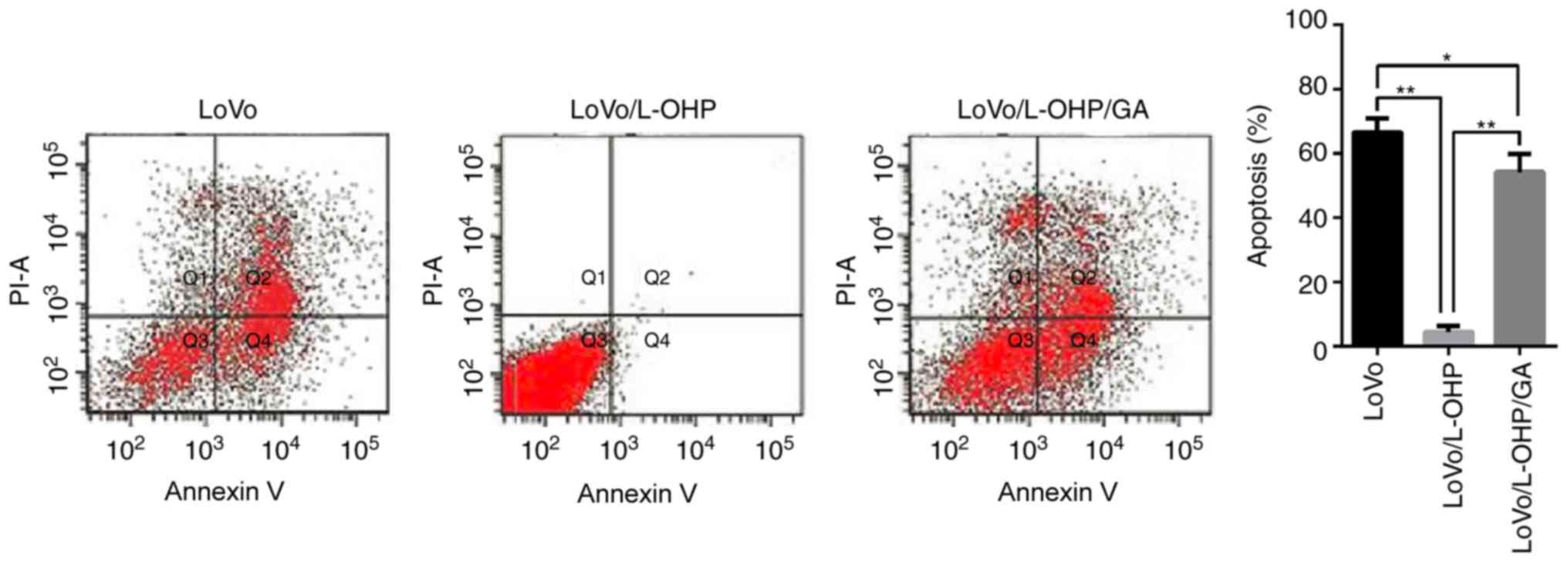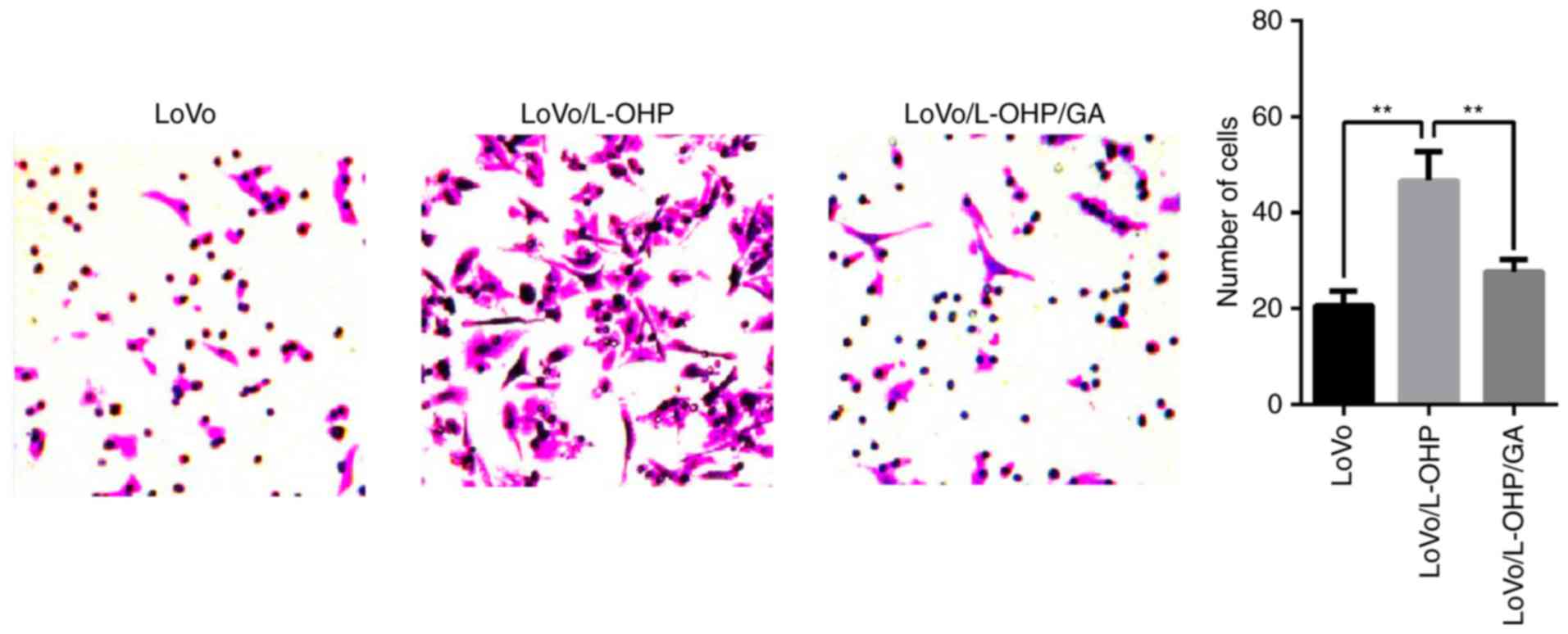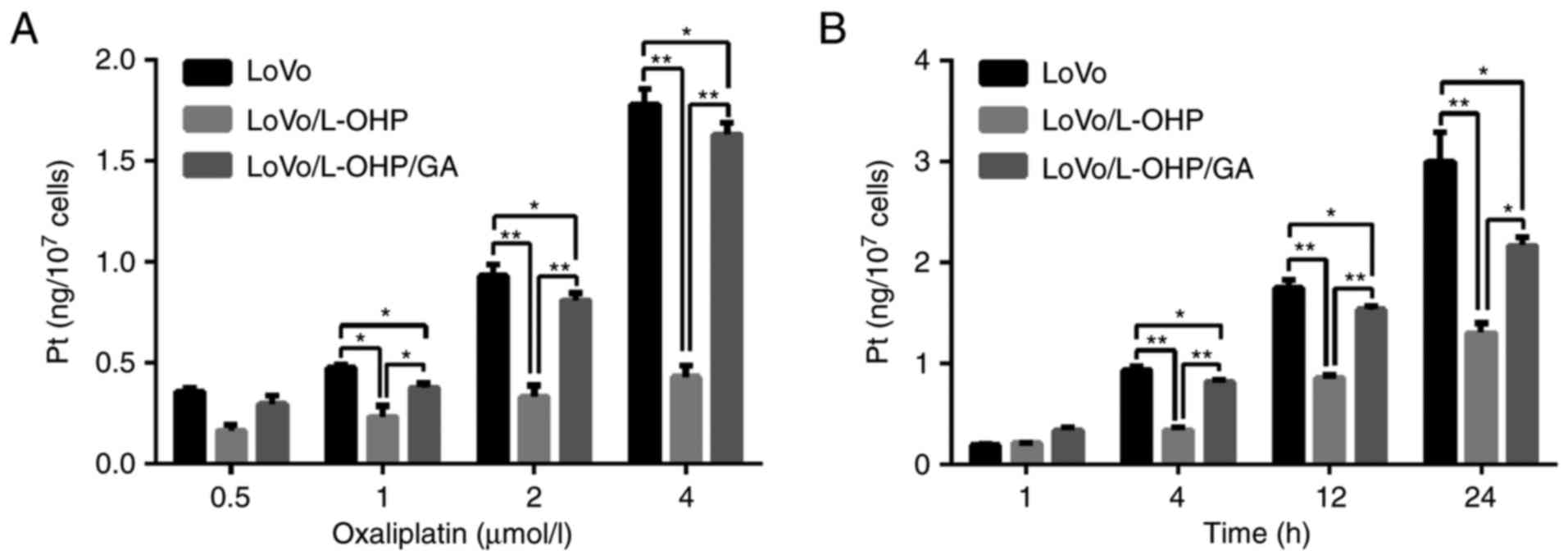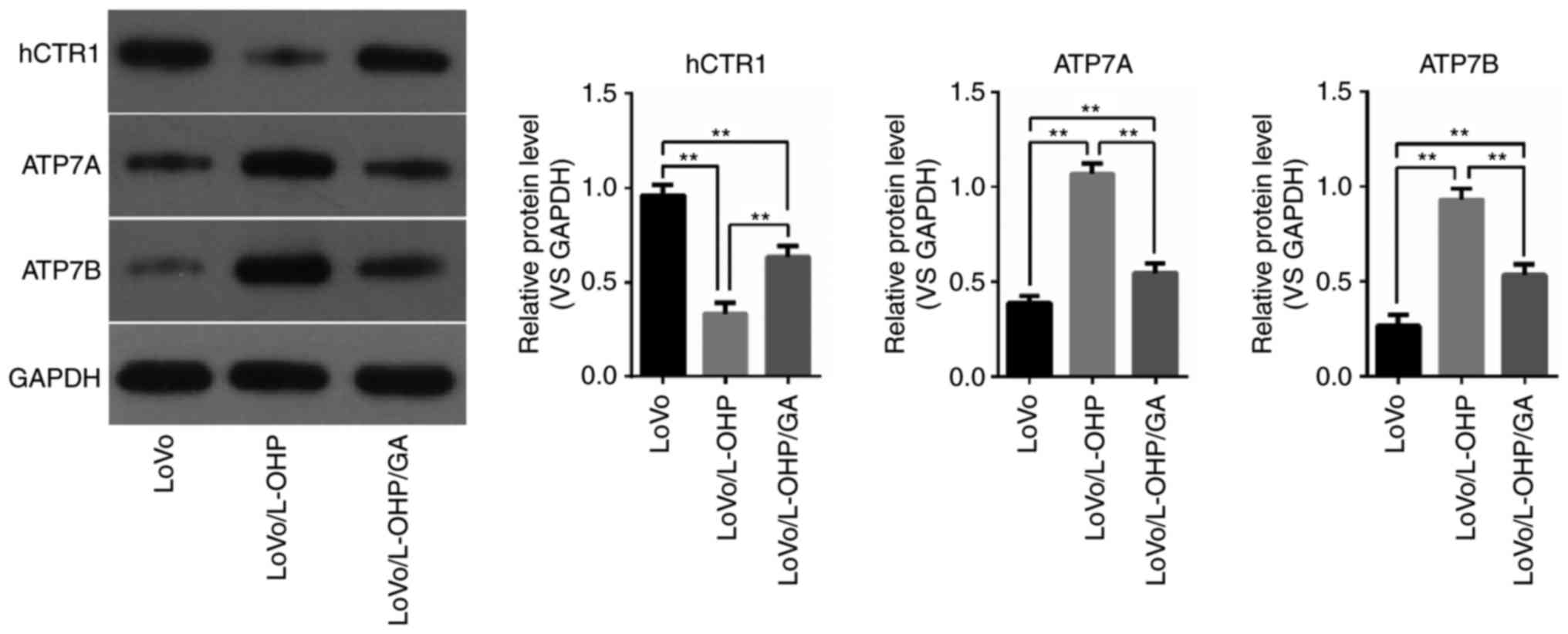|
1
|
Torre LA, Bray F, Siegel RL, Ferlay J,
Lortet-Tieulent J and Jemal A: Global cancer statistics, 2012. CA
Cancer J Clin. 65:87–108. 2015. View Article : Google Scholar : PubMed/NCBI
|
|
2
|
Chen W, Zheng R, Baade PD, Zhang S, Zeng
H, Bray F, Jemal A, Yu XQ and He J: Cancer statistics in China,
2015. CA Cancer J Clin. 66:115–132. 2016. View Article : Google Scholar : PubMed/NCBI
|
|
3
|
André T, Iveson T, Labianca R, Meyerhardt
JA, Souglakos I, Yoshino T, Paul J, Sobrero A, Taieb J, Shields AF,
et al: The IDEA (International Duration Evaluation of Adjuvant
Chemotherapy) collaboration: Prospective combined analysis of phase
III trials investigating duration of adjuvant therapy with the
FOLFOX (FOLFOX4 or modified FOLFOX6) or XELOX (3 versus 6 months)
regimen for patients with stage III colon cancer: Trial design and
current status. Curr Colorectal Cancer Rep. 9:261–269. 2013.
View Article : Google Scholar : PubMed/NCBI
|
|
4
|
Guo J, Zhu C, Yang K, Li J, Du N, Zong M,
Zhou J and He J: Poly(C)-binding protein 1 mediates drug resistance
in colorectal cancer. Oncotarget. 8:13312–13319. 2017.PubMed/NCBI
|
|
5
|
Alcindor T and Beauger N: Oxaliplatin: A
review in the era of molecularly targeted therapy. Cur Oncol.
18:18–25. 2011.
|
|
6
|
Martinez-Balibrea E, Martínez-Cardús A,
Ginés A, Ruiz de Porras V, Moutinho C, Layos L, Manzano JL, Bugés
C, Bystrup S, Esteller M and Abad A: Tumor-related molecular
mechanisms of oxaliplatin resistance. Mol Cancer Ther.
14:1767–1776. 2015. View Article : Google Scholar : PubMed/NCBI
|
|
7
|
Hall MD, Okabe M, Shen DW, Liang XJ and
Gottesman MM: The role of cellular accumulation in determining
sensitivity to platinum-based chemotherapy. Annu Rev Pharmacol
Toxicol. 48:495–535. 2008. View Article : Google Scholar : PubMed/NCBI
|
|
8
|
Harrach S and Ciarimboli G: Role of
transporters in the distribution of platinum-based drugs. Front
Pharmacol. 6:852015. View Article : Google Scholar : PubMed/NCBI
|
|
9
|
Rabik CA, Maryon EB, Kasza K, Shafer JT,
Bartnik CM and Dolan ME: Role of copper transporters in resistance
to platinating agents. Cancer Chemother Pharmacol. 64:133–142.
2009. View Article : Google Scholar : PubMed/NCBI
|
|
10
|
Zhang Y, Zhang Q, Fan Z, Sun J, Liu X,
Cheng L, Li A and Xu J: A Chinese herbal formula, Chang-Wei-Qin,
synergistically enhances antitumor effect of oxaliplatin. Pathol
Oncol Res. 21:389–397. 2015. View Article : Google Scholar : PubMed/NCBI
|
|
11
|
Qi Q, You Q, Gu H, Zhao L, Liu W, Lu N and
Guo Q: Studies on the toxicity of gambogic acid in rats. J
Ethnopharmacol. 3:433–438. 2008. View Article : Google Scholar
|
|
12
|
Wen C, Huang L, Chen J, Lin M, Li W, Lu B,
Rutnam ZJ, Iwamoto A, Wang Z, Yang X and Liu H: Gambogic acid
inhibits growth, induces apoptosis, and overcomes drug resistance
in human colorectal cancer cells. Int J Oncol. 47:1663–1671. 2015.
View Article : Google Scholar : PubMed/NCBI
|
|
13
|
Wang S, Wang L, Chen M and Wang Y:
Gambogic acid sensitizes resistant breast cancer cells to
doxorubicin through inhibiting P-glycoprotein and suppressing
survivin expression. Chem Biol Interact. 235:76–84. 2015.
View Article : Google Scholar : PubMed/NCBI
|
|
14
|
Wang J and Yuan Z: Gambogic acid
sensitizes ovarian cancer cells to doxorubicin through ROS-mediated
apoptosis. Cell Biochem Biophys. 67:199–206. 2013. View Article : Google Scholar : PubMed/NCBI
|
|
15
|
Wang T, Wei J, Qian X, Ding Y, Yu L and
Liu B: Gambogic acid, a potent inhibitor of survivin, reverses
docetaxel resistance in gastric cancer cells. Cancer Lett.
262:214–222. 2008. View Article : Google Scholar : PubMed/NCBI
|
|
16
|
Wang X, Deng R, Lu Y, Xu Q, Yan M, Ye D
and Chen W: Gambogic acid as a non-competitive inhibitor of
ATP-binding cassette transporter B1 reverses the multidrug
resistance of human epithelial cancers by promoting ATP-binding
cassette transporter B1 protein degradation. Basic Clin Pharmacol
Toxicol. 112:25–33. 2013. View Article : Google Scholar : PubMed/NCBI
|
|
17
|
Martinez-Cardús A, Martinez-Balibrea E,
Bandrés E, Malumbres R, Ginés A, Manzano JL, Taron M,
Garcia-Foncillas J and Abad A: Pharmacogenomic approach for the
identification of novel determinants of acquired resistance to
oxaliplatin in colorectal cancer. Mol Cancer Ther. 8:194–202. 2009.
View Article : Google Scholar : PubMed/NCBI
|
|
18
|
Plasencia C, Martínez-Balibrea E,
Martinez-Cardús A, Quinn DI, Abad A and Neamati N: Expression
analysis of genes involved in oxaliplatin response and development
of oxaliplatinresistant HT29 colon cancer cells. Int J Oncol.
29:225–235. 2006.PubMed/NCBI
|
|
19
|
Nguyen TT, Ostergaard J, Stürup S and
Gammelgaard B: Determination of platinum drug release and liposome
stability in human plasma by CE-ICP-MS. Int J Pharm. 449:95–102.
2013. View Article : Google Scholar : PubMed/NCBI
|
|
20
|
Xu J, Zhou M, Ouyang J, Wang J, Zhang Q,
Xu Y, Xu Y, Zhang Q, Xu X and Zeng H: Gambogic acid induces
mitochondria-dependent apoptosis by modulation of Bcl-2 and Bax in
mantle cell lymphoma JeKo-1 cells. Chin J Cancer Res. 2:183–191.
2013.
|
|
21
|
Duan D, Zhang B, Yao J, Liu Y, Sun J, Ge
C, Peng S and Fang J: Gambogic acid induces apoptosis in
hepatocellular carcinoma SMMC-7721 cells by targeting cytosolic
thioredoxin reductase. Free RadicBiol Med. 69:15–25. 2014.
View Article : Google Scholar
|
|
22
|
Zhao W, Zhou SF, Zhang ZP, Xu GP, Li XB
and Yan JL: Gambogic acid inhibits the growth of osteosarcoma cells
in vitro by inducing apoptosis and cell cycle arrest. Oncol Rep.
25:1289–1295. 2011.PubMed/NCBI
|
|
23
|
Lu N, Hui H, Yang H, Zhao K, Chen Y, You
QD and Guo QL: Gambogic acid inhibits angiogenesis through
inhibiting PHD2-VHL-HIF-1α pathway. Eur J Pharm Sci. 49:220–226.
2013. View Article : Google Scholar : PubMed/NCBI
|
|
24
|
Qi Q, Lu N, Li C, Zhao J, Liu W, You Q and
Guo Q: Involvement of RECK in gambogic acid induced anti-invasive
effect in A549 human lung carcinoma cells. Mol Carcinog. 54(Suppl
1): E13–E25. 2015. View
Article : Google Scholar : PubMed/NCBI
|
|
25
|
Howell SB, Safaei R, Larson CA and Sailor
MJ: Copper transporters and the cellular pharmacology of the
platinum-containing cancer drugs. Mol Pharmacol. 77:887–894. 2010.
View Article : Google Scholar : PubMed/NCBI
|
|
26
|
Ishida S, Lee J, Thiele DJ and Herskowitz
I: Uptake of the anticancer drug cisplatin mediated by the copper
transporter Ctr1 in yeast and mammals. Proc Natl Acad Sci USA.
99:14298–14302. 2002. View Article : Google Scholar : PubMed/NCBI
|
|
27
|
Song IS, Savaraj N, Siddik ZH, Liu P, Wei
Y, Wu CJ and Kuo MT: Role of human copper transporter Ctr1 in the
transport of platinum-based antitumor agents in cisplatin-sensitive
and cisplatin-resistant cells. Mol Cancer Ther. 3:1543–1549.
2004.PubMed/NCBI
|
|
28
|
Chen HH, Yan JJ, Chen WC, Kuo MT, Lai YH,
Lai WW, Liu HS and Su WC: Predictive and prognostic value of human
copper transporter 1 (hCtr1) in patients with stage III
non-small-cell lung cancer receiving first-line platinum-based
doublet chemotherapy. Lung Cancer. 75:228–234. 2012. View Article : Google Scholar : PubMed/NCBI
|
|
29
|
Ishida S, McCormick F, Smith-McCune K and
Hanahan D: Enhancing tumor-specific uptake of the anticancer drug
cisplatin with a copper chelator. Cancer Cell. 17:574–583. 2010.
View Article : Google Scholar : PubMed/NCBI
|
|
30
|
Chisholm CL, Wang H, Wong AH,
Vazquez-Ortiz G, Chen W, Xu X and Deng CX: Ammonium
tetrathiomolybdate treatment targets the coppertransporter ATP7A
and enhances sensitivity of breast cancer tocisplatin. Oncotarget.
51:84439–84452. 2016.
|
|
31
|
Li ZH, Zheng R, Chen JT, Jia J and Qiu M:
The role of copper transporter ATP7A in platinum-resistance of
esophageal squamous cell cancer (ESCC). J Cancer. 7:2085–2092.
2016. View Article : Google Scholar : PubMed/NCBI
|
|
32
|
Li ZH, Qiu MZ, Zeng ZL, Luo HY, Wu WJ,
Wang F, Wang ZQ, Zhang DS, Li YH and Xu RH: Copper-transporting
P-type adenosine triphosphatase (ATP7A) is associated with
platinum-resistance in non-small cell lung cancer (NSCLC). J Transl
Med. 10:212012. View Article : Google Scholar : PubMed/NCBI
|
|
33
|
Kitada N, Takara K, Minegaki T, Itoh C,
Tsujimoto M, Sakaeda T and Yokoyama T: Factors affecting
sensitivity to antitumor platinum derivatives of human colorectal
tumor cell lines. Cancer Chemother Pharmacol. 62:577–584. 2008.
View Article : Google Scholar : PubMed/NCBI
|
|
34
|
Mangala LS, Zuzel V, Schmandt R, Leshane
ES, Halder JB, Armaiz-Pena GN, Spannuth WA, Tanaka T, Shahzad MM,
Lin YG, et al: Therapeutic targeting of ATP7B in ovarian carcinoma.
Clin Cancer Res. 15:3770–3780. 2009. View Article : Google Scholar : PubMed/NCBI
|
|
35
|
Nakagawa T, Inoue Y, Kodama H, Yamazaki H,
Kawai K, Suemizu H, Masuda R, Iwazaki M, Yamada S, Ueyama Y, et al:
Expression of copper-transporting P-type adenosine triphosphatase
(ATP7B) correlates with cisplatin resistance in human non-small
cell lung cancer xenografts. Oncol Rep. 20:265–270. 2008.PubMed/NCBI
|
|
36
|
Leonhardt K, Gebhardt R, Mössner J,
Lutsenko S and Huster D: Functional interactions of Cu-ATPase ATP7B
with cisplatin and the role of ATP7B in the resistance of cells to
the drug. J Biol Chem. 284:7793–802. 2009. View Article : Google Scholar : PubMed/NCBI
|
|
37
|
Martinez-Balibrea E, Martínez-Cardús A,
Musulén E, Ginés A, Manzano JL, Aranda E, Plasencia C, Neamati N
and Abad A: Increasedlevels of copper efflux transporter ATP7B are
associated withpoor outcome in colorectal cancer patients receiving
oxaliplatin-based chemotherapy. Int J Cancer. 124:2905–2910. 2009.
View Article : Google Scholar : PubMed/NCBI
|




















